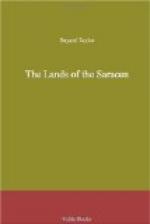Their eyes were more keen and lustrous than the diamonds which studded their head-stalls, and the wealth of emeralds, rubies, and sapphires that gleamed on their trappings would have bought the possessions of a German Prince. After them came the Sultan’s body-guard, a company of tall, strong men, in crimson tunics and white trousers, with lofty plumes of peacock feathers in their hats. Some of them carried crests of green feathers, fastened upon long staves. These superb horses and showy guards are the only relics of that barbaric pomp which characterized all State processions during the time of the Janissaries. In the centre of a hollow square of plume-bearing guards rode Abdul-Medjid himself, on a snow-white steed. Every one bowed profoundly as he passed along, but he neither looked to the right or left, nor made the slightest acknowledgment of the salutations. Turkish etiquette exacts the most rigid indifference on the part of the Sovereign, who, on all public occasions, never makes a greeting. Formerly, before the change of costume, the Sultan’s turbans were carried before him in the processions, and the servants who bore them inclined them to one side and the other, in answer to the salutations of the crowd.
Sultan Abdul-Medjid is a man of about thirty, though he looks older. He has a mild, amiable, weak face, dark eyes, a prominent nose, and short, dark brown mustaches and beard. His face is thin, and wrinkles are already making their appearance about the corners of his mouth and eyes. But for a certain vacancy of expression, he would be called a handsome man. He sits on his horse with much ease and grace, though there is a slight stoop in his shoulders. His legs are crooked, owing to which cause he appears awkward when on his feet, though he wears a long cloak to conceal the deformity. Sensual indulgence has weakened a constitution not naturally strong, and increased that mildness which has now become a defect in his character. He is not stern enough to be just, and his subjects are less fortunate under his easy rule than under the rod of his savage father, Mahmoud. He was dressed in a style of the utmost richness and elegance. He wore a red Turkish fez, with an immense rosette of brilliants, and a long, floating plume of bird-of-paradise feathers. The diamond in the centre of the rosette is of unusual size; it was picked up some years ago in the Hippodrome, and probably belonged to the treasury of the Greek Emperors. The breast and collar of his coat were one mass of diamonds, and sparkled in the early sun with a thousand rainbow gleams. His mantle of dark-blue cloth hung to his knees, concealing the deformity of his legs. He wore white pantaloons, white kid gloves, and patent leather boots, thrust into his golden stirrups.




